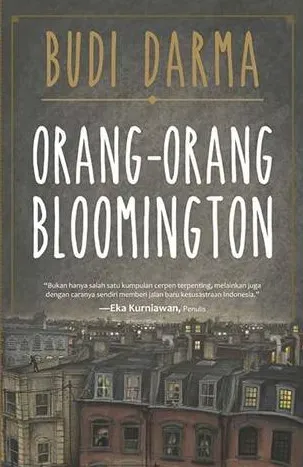Orang-Orang Bloomington

Author: Budi Darma
Category: Fiction, literature
Language: Indonesian
Publication Year: 1980
Pages: 246
Description:
*Orang-Orang Bloomington* by Budi Darma is an exceptional collection of short stories that showcases the absurd, melancholic, and often bizarre lives of the residents of Bloomington, a small town in the United States. What makes this work particularly intriguing is how the Indonesian author, who lived in the U.S. during his studies, captures the idiosyncrasies of everyday American life while filtering them through his distinctly Indonesian lens.
The book consists of seven stories, each with its own peculiar set of characters. These stories revolve around ordinary people who, upon closer inspection, aren't as ordinary as they seem. They are lonely, socially awkward, sometimes obsessive individuals whose inner lives are often as isolated as their external ones. Despite being set in America, these characters feel universal. Budi Darma digs deep into human behavior, unearthing those quirks we often keep hidden, and presenting them in an almost clinical yet empathetic way.
One of the strongest aspects of *Orang-Orang Bloomington* is Budi Darma’s ability to build an eerie atmosphere with very little effort. His writing is understated, yet it effortlessly pulls you into the strange, often claustrophobic world of his characters. His descriptions of Bloomington itself are sparse but effective—there’s a sense of stillness and suffocation that permeates the town. The streets, the apartment buildings, the library—everything feels soaked in quiet despair.
The title story, “Orang-Orang Bloomington” (“The People of Bloomington”), serves as an excellent example of this. It focuses on a series of characters who all seem disconnected from each other and from the world around them. Each of these people carries some weight of isolation or personal grief, but they all express it in different ways—through obsession, avoidance, or passive resignation. Budi Darma excels at portraying the mundane interactions between people while hinting at the much deeper, often darker emotions simmering beneath the surface.
Another standout story is “Laki-Laki Tua tanpa Nama” (“The Old Man Without a Name”), which tells the tale of a reclusive, nameless man whose interactions with others are painfully awkward. The protagonist’s sense of detachment from society, combined with his strange behavior, gradually builds an uneasy tension. You’re never quite sure if he’s a harmless oddball or if there’s something more sinister at play, and Budi Darma skillfully plays with that ambiguity.
What’s interesting is that Budi Darma rarely gives his characters any dramatic resolution or growth. They remain stuck in their own patterns, repeating the same mistakes, and often deepening their alienation from others. This might frustrate some readers who are looking for a more conventional character arc, but it’s part of what makes these stories feel so authentic. Real life, after all, rarely wraps up in neat little bows.
Humor in *Orang-Orang Bloomington* is subtle but ever-present. It’s the kind of dry, almost absurd humor that sneaks up on you. You find yourself chuckling not at overt jokes but at the ridiculousness of certain situations or the sheer awkwardness of the characters. This humor never detracts from the emotional weight of the stories, though—it enhances it, making the characters’ loneliness and oddness feel even more poignant.
Budi Darma’s writing is deceptively simple. He doesn’t rely on flowery language or elaborate metaphors. His prose is clean, direct, and often unembellished, but it leaves a lasting impact. He manages to convey complex emotions and situations with very few words, and the result is a collection of stories that linger with you long after you’ve finished reading.
One possible downside is that *Orang-Orang Bloomington* can be slow or repetitive at times. The characters’ repetitive, often static lives may wear on some readers, and there isn’t always a clear sense of forward momentum in the stories. But this won't be a drawback for readers who appreciate character-driven narratives and psychological depth.
Overall, *Orang-Orang Bloomington* is a fascinating, haunting exploration of loneliness, social awkwardness, and the quiet despair that can lurk beneath the surface of ordinary lives. Budi Darma offers a unique perspective on American life, filtered through an Indonesian sensibility, and his ability to capture the absurdity and sadness of human existence is truly remarkable. This is a collection that stays with you—not because of any grand revelations or plot twists, but because it gets under your skin in the most subtle, unsettling way.
Personal Notes:
Now re-reading after decades.
Back to Home